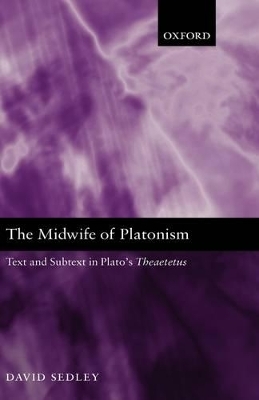
The Midwife of Platonism
Text and Subtext in Plato's Theaetetus
Seiten
2004
Oxford University Press (Verlag)
978-0-19-926703-3 (ISBN)
Oxford University Press (Verlag)
978-0-19-926703-3 (ISBN)
Proposes and develops a solution, based on a two-level reading. Offering significant reinterpretations of the dialogue's main arguments, this book is addressed to readers interested in Plato, and does not require knowledge of Greek.
Plato's Theaetetus is an acknowledged masterpiece, and among the most influential texts in the history of epistemology. Since antiquity it has been debated whether this dialogue was written by Plato to support his familiar metaphysical doctrines, or represents a self-distancing from these. David Sedley's book offers a via media, founded on a radical separation of the author, Plato, from his main speaker, Socrates. The dialogue, it is argued, is addressed to readers familiar with Plato's mature doctrines, and sets out to show how these doctrines, far from being an abandonment of his Socratic heritage, are its natural outcome. The Socrates portrayed here is the same Socrates as already portrayed in Plato's early dialogues. While not a Platonist, he is exhibited - to put it in terms of an image made famous by this dialogue - as having been Platonism's midwife. In a comprehensive rereading of the text, Sedley tracks the ways in which Socrates is shown unwittingly preparing the ground for Plato's mature doctrines, and reinterprets the dialogue's individual arguments from this perspective. The book is addressed to all readers interested in Plato, and does not require knowledge of Greek.
Plato's Theaetetus is an acknowledged masterpiece, and among the most influential texts in the history of epistemology. Since antiquity it has been debated whether this dialogue was written by Plato to support his familiar metaphysical doctrines, or represents a self-distancing from these. David Sedley's book offers a via media, founded on a radical separation of the author, Plato, from his main speaker, Socrates. The dialogue, it is argued, is addressed to readers familiar with Plato's mature doctrines, and sets out to show how these doctrines, far from being an abandonment of his Socratic heritage, are its natural outcome. The Socrates portrayed here is the same Socrates as already portrayed in Plato's early dialogues. While not a Platonist, he is exhibited - to put it in terms of an image made famous by this dialogue - as having been Platonism's midwife. In a comprehensive rereading of the text, Sedley tracks the ways in which Socrates is shown unwittingly preparing the ground for Plato's mature doctrines, and reinterprets the dialogue's individual arguments from this perspective. The book is addressed to all readers interested in Plato, and does not require knowledge of Greek.
1. Opening moves ; 2. 'Knowledge is perception' ; 3. Relativism ; 4. Perception ; 5. Falsity puzzles ; 6. Accounts ; Bibliography ; Index locorum ; General index
| Erscheint lt. Verlag | 20.5.2004 |
|---|---|
| Verlagsort | Oxford |
| Sprache | englisch |
| Maße | 145 x 224 mm |
| Gewicht | 364 g |
| Themenwelt | Geisteswissenschaften ► Philosophie ► Erkenntnistheorie / Wissenschaftstheorie |
| Geisteswissenschaften ► Philosophie ► Philosophie Altertum / Antike | |
| ISBN-10 | 0-19-926703-0 / 0199267030 |
| ISBN-13 | 978-0-19-926703-3 / 9780199267033 |
| Zustand | Neuware |
| Haben Sie eine Frage zum Produkt? |
Mehr entdecken
aus dem Bereich
aus dem Bereich
die Grundlegung der modernen Philosophie
Buch | Softcover (2023)
C.H.Beck (Verlag)
CHF 25,20
Buch | Softcover (2023)
Reclam, Philipp (Verlag)
CHF 9,80

![Was heißt Denken?. Vorlesung Wintersemester 1951/52. [Was bedeutet das alles?] - Martin Heidegger](/media/113619842)
